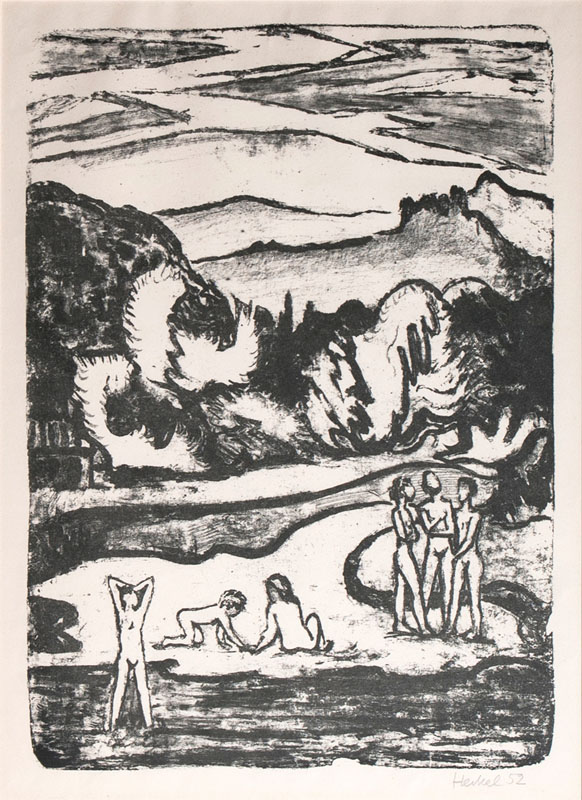Bathing Children
Erich Heckel (Döbeln 1883 - Radolfzell/Bodensee 1970)

Lot-No. 160
Proceeds : 600 €
1952, Lithograph, 37 x 26 cm, l. r. sign. a. dat., one of 344 copies edited by the Griffelkunst-Vereinigung Hamburg, min. dam., matted a. framed under glass. - Literature: Dube, Nr. 354 III. - One of the most eminent exponents of expressionism. H. was besides Kirchner, Schmidt-Rottluf a. F. Bleyl among the founders of the ‘Brücke’ in Dresden in 1905. He he shared a studio with Kirchner for a extended period, after travelling widely he moved to Berlin in 1911 where he contributed to establish expressionism internationally. During World War I he served as corpsman in Flanders where he met M. Beckmann a. J. Ensor. After the war he received numerous private a. public commissions, as early as 1931 he was honoured with a great retrospective. Outlawed by the Nazis he retired to Lake Constance, a large number of his works was seized a. destroyed. After WW II many exhibitions a. awards payed tribute to him, among others he exhibited at the Documenta I in 1955. From 1949 to 1955 he was lecturer at the Karlsruhe academy.
Erich Heckel: Bathing Children
Erich Heckel (Döbeln 1883 - Radolfzell/Bodensee 1970)
Bathing Children
Lot-No. 160
Proceeds : 600 €
1952, Lithograph, 37 x 26 cm, l. r. sign. a. dat., one of 344 copies edited by the Griffelkunst-Vereinigung Hamburg, min. dam., matted a. framed under glass. - Literature: Dube, Nr. 354 III. - One of the most eminent exponents of expressionism. H. was besides Kirchner, Schmidt-Rottluf a. F. Bleyl among the founders of the ‘Brücke’ in Dresden in 1905. He he shared a studio with Kirchner for a extended period, after travelling widely he moved to Berlin in 1911 where he contributed to establish expressionism internationally. During World War I he served as corpsman in Flanders where he met M. Beckmann a. J. Ensor. After the war he received numerous private a. public commissions, as early as 1931 he was honoured with a great retrospective. Outlawed by the Nazis he retired to Lake Constance, a large number of his works was seized a. destroyed. After WW II many exhibitions a. awards payed tribute to him, among others he exhibited at the Documenta I in 1955. From 1949 to 1955 he was lecturer at the Karlsruhe academy.


